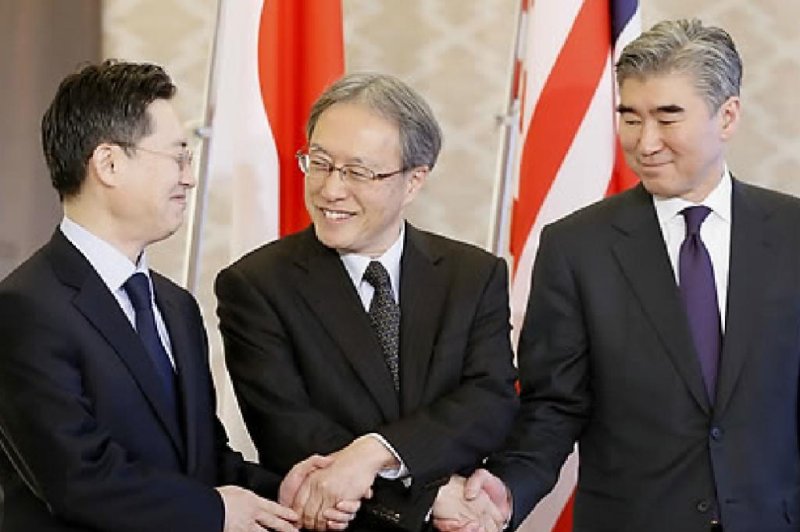Hwang Joon-kook, left, South Korea's special representative for Korean Peninsula Peace and Security Affairs, Junichi Ihara, center, director-general of the Japanese foreign ministry's Asian and Oceanian Affairs Bureau and Sung Kim, on right, the U.S. Special Envoy for the Six-Party Talks met for the first time in four months. Photo by Yonhap
SEOUL, May 26 (UPI) -- Envoys of the stalled six-party talks on North Korea met bilaterally in Seoul to salvage a framework for dialogue that has been suspended since 2008.
The special representatives of the U.S., South Korea and Japan met one-on-one in order to find new solutions to a persistent nuclear problem, reported South Korean news agency Yonhap.
This was the first time Hwang Joon-kook, South Korea's special representative for Korean Peninsula Peace and Security Affairs, Sung Kim, the U.S. Special Envoy for the Six-Party Talks and Junichi Ihara, director-general of the Japanese foreign ministry's Asian and Oceanian Affairs Bureau have met since Jan. 28 in Tokyo.
The sobering reality of North Korea's nuclear development dominated the agenda.
North Korea's recent claim of a SLBM, or submarine-launched ballistic missile launch and the purge of North Korean Defense Minister Hyon Yong Chol are both signs the situation on the Korean peninsula remains volatile.
In their preliminary dialogue on Tuesday, Hwang, Kim and Ihara discussed many methods that could still bring North Korean back to the negotiation table – including deterrence, pressure, and dialogue.
The three parties have also considered "exploratory dialogue" with their Pyongyang counterpart that could lower the bar for the resumption of multilateral talks, reported the Korea Herald.
The suggestion, however, has not been placed in action, mostly due to North Korea's determination to continue on its path toward becoming a nuclear state.
The envoys of the U.S., South Korea and Japan also likely discussed the optimal combination of deterrence, pressure and dialogue in its North Korea engagement, ahead of a May 28-29 Beijing visit with their China counterpart Wu Dawei.
Analysts in South Korea said they were skeptical about the outcome of the multilateral talks – reports did not mention whether Russia would be included in these talks that are to be held in the absence of North Korean attendance.
"[E]ven if the talks should be resumed, it is difficult to forge an agreement that would please all the participants as they have different thoughts over how to pressure the North to renounce its nuclear ambitions," said Park Hyeong-jung, a senior research fellow at the Korea Institute for National Unification in South Korea.















